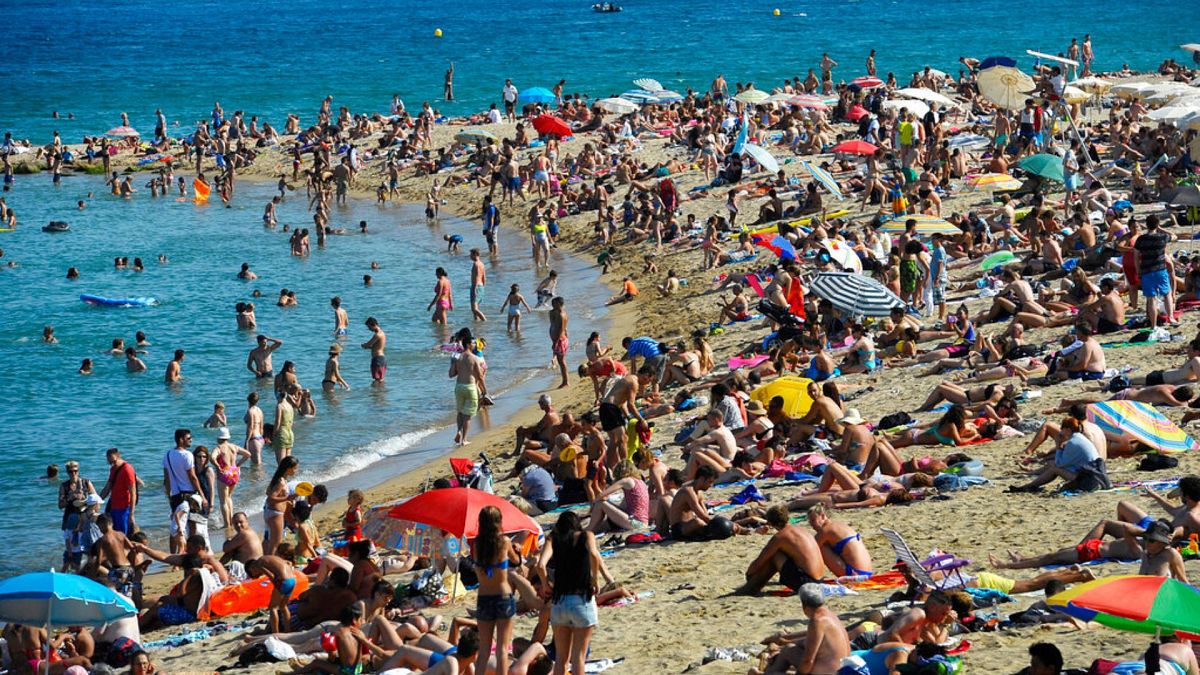Amsterdam brought in new rules for Airbnb hosts in 2022 and the results are revealing.
Short-term rental booking platform Airbnb has hit back at Spanish restrictions on rental properties, stressing that they will have severe repercussions for both income and jobs.
Citing research undertaken by Oxford Economics in late 2024, Airbnb warns of 400,000 jobs being put at risk by the regulations, alongside almost €30 billion of income.
The Spanish government implemented new regulations on short-term rentals on 2 January. Any property owner wishing to rent out their house is now required to be registered in a national database and obtain a permit before they can list their property on booking platforms.
Accommodation providers are also required to collect sensitive personal information from their guests, including bank details and personal identifiers. Spain has also proposed to raise VAT on short-term rentals to match the 10 per cent paid by hotels.
Although it went live in January, the regulation won’t be fully enforced until 1 July. After that date, property owners risk fines of up to €600,000 for non-compliance.
Why is Spain placing these restrictions on rental properties?
For the Spanish government, companies like Airbnb are fueling a housing crisis that can only be stopped through regulation.
“Our obligation is to prioritise use of homes over tourist use,” Prime Minister Pedro Sanchez said at a press conference last week. “There are too many Airbnbs. What’s lacking is housing.”
Sanchez claims that non-residents from outside the EU bought approximately 27,000 houses and apartments in Spain in 2023, not to live in but to make money from. “With the housing scarcity that we have, we clearly cannot allow this,” he concluded.
Alongside restrictions on who can rent out houses and new red tape for potential landlords, Spain is hoping to apply a tax of up to 100 per cent on property purchases for non-EU buyers. This would include buyers from the UK.
Another reason for the changes is residents speaking against the effects of overtourism. Throughout 2024, parts of Spain were rocked by dramatic anti-tourism protests at visitor hotspots, with more expected in 2025.
Despite local protests, Spain saw a 10 per cent increase in visitors in 2024, with 94 million foreign tourists visiting according to Tourism Minister Jordi Hereu.
For property owners, the implementation of these new rules is an unwelcome and often confusing addition.
“There is a lot of uncertainty about it,” says Samuel Toribio, head of Europe at rental platform Homelike. “We are seeing different layers of legislation being applied at the same time that in some cases are contradictory.”
Toribio notes that these different applications at municipal, regional and nationwide levels are causing confusion in the market. While the national policy requires a registration number, some regions are implementing the rules differently.
In Andalucia, for example, the rules change depending on the length of the rental term, and in Madrid, a rule is being passed preventing any new short-term rentals in the city centre. “There is a lack of standardisation in the scene that leads to worrying uncertainty,” he added.
Airbnb warns of impacts on rural communities and small businesses
The Oxford Economics report found that 141 million guest nights were spent in short-term rentals in Spain in 2023. Hosts earned €5.4 billion, but having those guests in Spain earned the economy €29.6 billion through spending in shops, restaurants and local businesses.
“Excessive restrictions imposed on short-term rentals will not only be detrimental to hosts but also to rural development and commercial activity in small local businesses,” says Airbnb. “They will also harm family tourism that simply seeks to find affordable accommodation in non-crowded areas, damaging Spain’s competitiveness as a family destination.”
Data from Eurostat shows a trend towards rural and less-visited locations for short-term rentals. In 2023, 33.6 per cent of nights were spent in rural areas, up from 31 per cent in 2018, an increase of 17.6 million guest nights.
Last year, around 150 small Spanish towns and municipalities welcomed their first tourists, and Airbnb has rentals available in more than 5,000 rural and non-urban localities across the country.
“Airbnb’s role in promoting these rural experiences enhances the appeal of these destinations, empowers local communities, and encourages sustainable tourism practices,” concludes Oxford Economics.
Airbnb says 70 per cent of its bookings are for properties in rural or low-density urban areas.
“By staying in a holiday home, these travellers have discovered new neighbourhoods and landscapes,” said Juliette Langlais, EMEA Public Affairs Director at Airbnb. “By directing tourists away from crowded urban destinations where hotel supply, concentrated tourist flows and local challenges accumulate, short-term rentals have dispersed the benefits of tourism to local families and business in countless rural destinations.”
Rental platform HomeToGo told Euronews Travel that, in 2024, 87 per cent of its searches for stays in Spain were for rural destinations.
Do restrictions on holiday rentals solve overtourism?
Case studies from other cities where restrictions on short-term rentals have been imposed suggest this will not be the golden bullet Spain is looking for.
In Amsterdam, which has implemented a number of regulations on short-term rentals, the tourists haven’t stopped coming. Since the current regulations were introduced in 2022, the overall guest nights in the city have increased by 12 per cent.
While hotels have seen guest nights soar, the impact of the regulations has hit short-term rental owners disproportionately. In the same period, there was a 52 per cent decrease in short-term rental guest nights, which Oxford Economics says could mean €269 million in potential host earnings have been lost.
The report also flags a growing ‘informal’ rental market, where hosts simply ignore the system and rent to guests unofficially, advertising in classifieds or on social media instead of regulated platforms.
“Airbnb understands that in certain areas popular with tourists, where dedicated short-term rentals make up a large share of the housing stock, the impact on housing costs and availability could be relatively high,” says Jaime Rodríguez de Santiago, General Manager of Airbnb Spain. “This is where Airbnb is open to working with governments to enforce targeted and tiered regulation.”
Short-term rentals make up a tiny proportion of the total housing stock in major European cities. Amsterdam has the highest proportion, but it’s still only 1.5 per cent. In Spain, 1.2 per cent of Barcelona and Madrid’s housing is classified as short-term rentals.
But even this is not the full picture, as many of those rentals are lived in for at least some of the year by the property owners. When it comes to dedicated rentals, which are available for at least 180 nights a year, Madrid’s share is 0.1 per cent and Barcelona’s 1.3 per cent.
Airbnb claims that the hotel lobby has been pushing the message that short-term rentals are to blame for housing shortages. But if it’s not Airbnb and similar platforms causing the housing crisis, what is?
“The main issue is the lack of supply,” Samuel Toribio told Euronews Travel. “The rhythm of new houses built hasn’t yet reached the standards of 2007 due to an increased cost of production, lack of professionals in the industry and inability to attract investment.”
Toribio also cites the new residential law in Spain, which came into effect in 2023, as being ‘scary’ for the industry. He says that there is a lack of fiscal incentives for private landlords to put more housing on the market.
Airbnb Spain says the fundamental problem is not enough houses being built. “In the last decade, Spain has built fewer homes than at any point since 1970,” a spokesperson told Euronews Travel. “In 2023, data from the Ministry of Housing shows that the creation of new households in Spain outpaced the number of new homes built by three to one.”
The rental platform also points out that Spain has over four million vacant homes, accounting for more than 14 per cent of its housing stock.
When it comes to overtourism, Toribio notes that discussions are needed that go beyond the current regulations. “There is a huge need for a discussion around potential quotas and the type of tourism that cities can absorb,” he says.
Airbnb and the Oxford Economics report both flag that, by implementing these restrictions, Spain could actually be driving more tourism to the already overcrowded cities and urban areas.
“These regulatory limitations are contributing to Spain’s tourism economy being heavily reliant on international hotel chains, super-concentrated in certain urban and coastal areas,” says Airbnb. “This is fueling mass tourism and driving up accommodation prices for travellers, with little or no benefit to local families.”
Read the full article here


